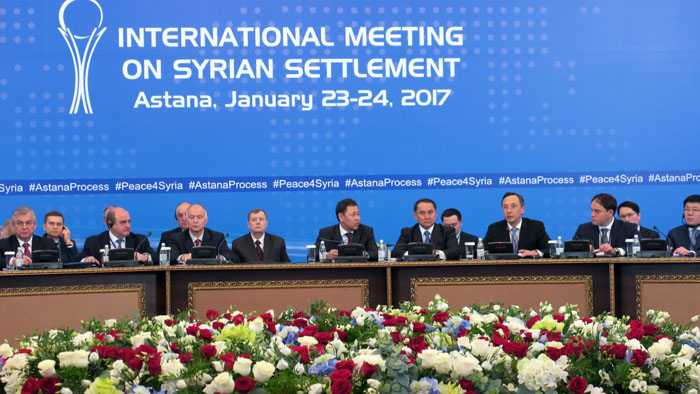Turkey, Russia and Iran agreed on Tuesday at peace talks in Astana to create a mechanism to audit the implementation of the cease-fire in Syria.
The decision was announced at the end of the talks on Tuesday by Kazakh Foreign Minister Kayrat Abdrahmanov, with the participants urging the contribution and support of the international community for the United Nations-led Geneva talks. The Geneva talks will be held on Feb. 8, and both the Syrian government and the opposition will be invited.
The Astana talks brought together for the first time the armed opposition, the representatives of the Syrian regime, Iran, Turkey and Russia in an international initiative.
Meanwhile, on Monday Syrian Kurdish militia the People’s Protection Units (YPG), the armed wing of the Kurdish Democratic Union Party (PYD), said that it would not be bound by any decision that comes out of the peace talks
According to Reuters, the YPG said in a statement “As we are not participating in these talks, we stress that we are not bound by any decisions issued from the Astana conference.”
“We in the YPG believe the entities that are participating and that have sponsored these talks are part of the problem in Syria in the first place,” the YPG said.
There are no senior government figures among the delegations, with Deputy Undersecretary of the Turkish Foreign Ministry Sedat Önal representing Turkey and Russia’s Special Envoy on Syria Alexander Lavrentiev and Russian Deputy Foreign Minister Mikhail Bogdanov representing Russia.
While Syria’s UN Ambassador Bashar al-Jaafari, an experienced negotiator involved in the failed talks in Geneva, headed the regime delegation, Mohamed Alloush of Jaish al-Islam (Army of Islam) headed the Syrian opposition’s delegation at the talks. He led a “military delegation” of around 14 people, in addition to 21 legal and political advisers from the opposition High Negotiations Committee (HNC) umbrella group.
UN Envoy for Syria Staffan de Mistura, Kazakh Foreign Minister Kairat Abdrakhmanov, Iran’s Deputy Foreign Minister Hossein Jaber Ansari, US Ambassador to Astana George Krol and representatives of France, Britain and the EU also participated in the talks.
In December, after Russian President Vladimir Putin and his Turkish counterpart, Recep Tayyip Erdoğan, discussed with Kazakh President Nursultan Nazarbayev the possibility of holding a meeting in Astana between the warring parties in the Syrian conflict, Putin said the leaders of Turkey, Iran, Syria and Russia were prepared to start peace talks.
The Turkey-Russia brokered Aleppo truce, which began in Syria on Dec. 30 to pave the way for the new peace talks, excluded terror groups such as the Islamic State in Iraq and the Levant (ISIL) and Jabhat Fateh al-Sham.
Kurdish rebel groups PYD and YPG, which control most areas of northern Syria, are being excluded from the talks in line with the wishes of Turkey.

